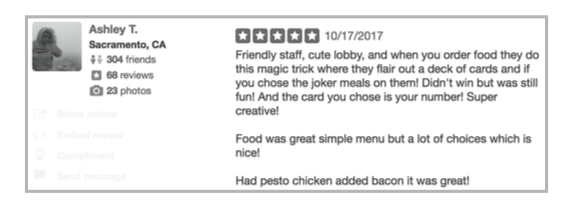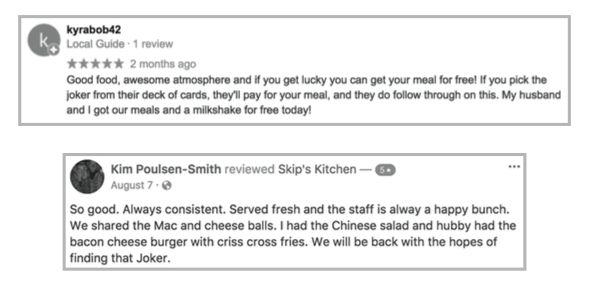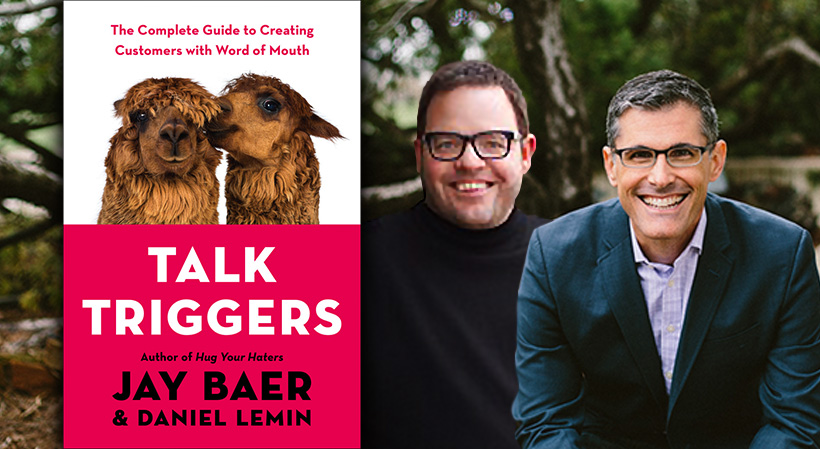The following is excerpted from “Talk Triggers: The Complete Guide to Creating Customers with Word of Mouth” by Jay Baer and Daniel Lemin with permission of Portfolio, an imprint of Penguin Publishing Group, a division of Penguin Random House LLC. Copyright © Jay Baer and Daniel Lemin, 2018.
Skip’s Kitchen
For 17 years, Skip Wahl worked his way up the ranks at Brinker International Restaurants, owner of the Chili’s chain, among others. At his peak, Wahl was managing partner of one of the busiest Chili’s locations in Northern California.
“It was a lot of fun,” he recalls. “But I was not necessarily a rule follower. I was more of a rule challenger. I was the guy always raising his hand in meetings and asking why,” says Wahl.
“That limited my chances for advancement, and after a lot of research and conversations with my wife, we decided in 2010 to open our own spot in Sacramento.”
Skip’s Kitchen is a simple affair, with a concise menu (think of it as the anti–Cheesecake Factory) featuring outstanding hamburgers, great fries, a few interesting appetizers, and a lot of fun twists. How good are the burgers? Skip’s Kitchen was named America’s 29th best hamburger purveyor in 2017.
Since the day his restaurant opened on October 10, 2011, Wahl has spent a grand total of zero on advertising and marketing. Certainly, great burgers help. As does Wahl and his wife’s commitment to the local community and warm and inviting customer service.
Related: How to Build Word-of-Mouth Marketing Buzz for Your Business
But because it’s difficult to have food quality and service quality that are so off the scale that they register as remarkable and talkable, other characteristics have to do the heavy lifting instead when it comes to generating word-of-mouth. In fact, 2016 research from Nur A’mirah Hassan Basri and collaborators found that the quality and uniqueness of a restaurant’s physical environment are the most important factors in influencing dining choices, and the least important factor is food quality.
The success of Skip’s Kitchen reflects those insights. The restaurant has a remarkably generous talk trigger that also creates an electric physical environment. The creation and adoption process of this differentiator was equal parts intuition and necessity.
The necessity part came from the problem of tracking customers’ orders. Wahl at first just tried to remember what each of his nine tables had ordered at the counter, but that got confusing on the first day. He then considered using plastic numbers that guests would prop up on their table, similar to how Carl’s Jr. and Hardee’s restaurants deliver orders. But he wanted to do something more visually interesting, so he thought, “Let’s just use a deck of cards.”
“People come in and order and we’d give them a card, and they’d get the three of clubs or something. So we write that down on their ticket, and when the food comes up, we deliver it to the one with the three of clubs on the table,” Wahl explained.
But Wahl didn’t just want to make food delivery more organized. He wanted a hook. “It’s a small place. Not that much room. So when it’s busy, the line can be out the door, and that was starting to actually hurt business,” Wahl remembers. “There’s this old saying by Yogi Berra: ‘Nobody goes there anymore. It’s too crowded.’ That was becoming a problem for us.”
Needing a mechanism to keep patrons standing patiently in line, he first pondered installing outdoor televisions but then hit upon a superior idea that creates much better stories.
“It was a Friday morning and two ladies in their mid-70s came in and ordered two Asian salads with chicken, and I said, ‘Ladies, I’m going to try something here,’” Wahl remembers. “‘I’m going to fan out these playing cards facedown, and if you pick the joker, your entire meal is free.’
“One of them picked a card and boom, she picked the joker. First time out of the chute, a winner! And I said, ‘This may be a terrible and expensive idea!’”
But Wahl persisted for the remainder of the day, and customers loved the chance to win. So he tried it again the next day. And the next.
Sign Up: Receive the StartupNation newsletter!
“People’s eyes started lighting up, and they jockeyed for position in the line to be able to see the customers in front of them try it. When they came in groups, while in line, they started talking about who was going to pick the card,” he recalls.
“From a business perspective, the better way to do it would be to pay for half of your order. Or, to give you a gift card. But it just didn’t have the right ring to it. It’s much stronger to say to every guest, ‘You pick the joker, I’m buying your meal.’”
On average, four customers win every day, meaning Wahl gives away approximately 2 percent of his orders. But when they win, the talk trigger pays off repeatedly. Lucky patrons take selfies, post to Facebook, write reviews, and tell their friends.


Even though it costs more in free food, from a word-of-mouth perspective it’s better for Wahl when larger groups of customers pull the joker. The biggest bill he’s had to cover was $117.86, when a group of ten hungry Eagle Scouts ordered many, many burgers.
“The last kid to order I knew from around town. His name is Christian,” recalled Wahl. “He ordered his burger and he said, ‘And I’m going to pick the joker and it’s right there.’ And he turned the card over and boom, it was right there. They all ran around the restaurant like they just won the Super Bowl! The whole place was clapping and high-fiving them. And when they went home, guess what they told their parents? ‘I hit the joker.’ And it creates return business.”
The joker at Skip’s Kitchen is so well known now that some Sacramento residents don’t even know the name of the restaurant—but they know the talk trigger.
The “card trick” is so popular that Skip’s Kitchen diners occasionally try to game the system. When the nine-table restaurant is packed, nine cards are out of the deck at the tables, raising the odds of winning from one in 53 to one in f44. Guests will sometimes “graciously” allow others to cut in line in front of them, purposefully delaying their own orders until the odds improve.
Frequent customers often bring Wahl souvenir decks of cards from their travels, which he proudly displays near the Skip’s Kitchen T-shirts. Amazingly, the shirts are not for sale. You can only get one if your name is also Skip; if it is, the shirt is free. Thirteen have been redeemed.
Consumers are so accustomed to constantly getting less that giving them just a little bit more (or at least a chance to get more, like at Skip’s Kitchen) can be enough to get them telling your story and igniting word-of-mouth. But some organizations are unwilling or unable to use largesse as a talk trigger.
Instead, they rely on nimbleness to shock their customers and fans into proactive conversations. Like Taylor Swift changing musical genres, these talk triggers are talkably fast. Let’s take a look at how they do it.
“Talk Triggers” is available now at fine booksellers and can be purchased via StartupNation.com.






